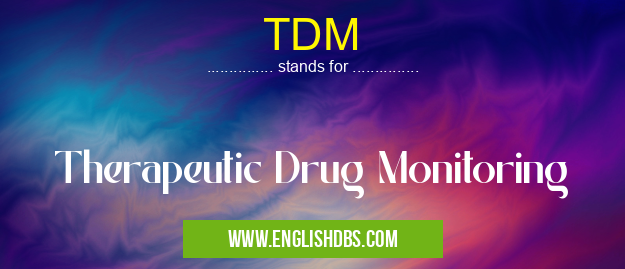What does TDM mean in NURSING
Therapeutic Drug Monitoring (TDM) is a crucial aspect of medical care that involves measuring the concentration of a drug in a patient's body to optimize its therapeutic effects and minimize adverse reactions. It is a valuable tool for ensuring the safe and effective use of medications, particularly those with a narrow therapeutic index.

TDM meaning in Nursing in Medical
TDM mostly used in an acronym Nursing in Category Medical that means Therapeutic Drug Monitoring
Shorthand: TDM,
Full Form: Therapeutic Drug Monitoring
For more information of "Therapeutic Drug Monitoring", see the section below.
What does TDM mean?
TDM stands for Therapeutic Drug Monitoring. It is a clinical practice that involves:
- Measuring the concentration of a drug in a patient's blood or other body fluids
- Interpreting the results to determine if the drug is within the desired therapeutic range
- Adjusting the drug dosage as necessary to achieve the optimal therapeutic outcome
Objectives of TDM
The primary objectives of TDM are to:
- Ensure that the patient is receiving an adequate dose of the drug to achieve the desired therapeutic effect
- Minimize the risk of adverse drug reactions by maintaining drug concentrations within a safe range
- Individualize drug therapy based on the patient's unique characteristics, such as age, weight, and renal function
Methods of TDM
TDM is typically performed by analyzing a blood sample, but other body fluids, such as saliva or urine, can also be used. The sample is collected at a specific time point after the drug has been administered to ensure that the drug concentration is at its peak or trough level. The concentration is then measured using various analytical techniques, such as:
- Chromatography
- Mass spectrometry
- Immunoassays
Role of Pharmacists in TDM
Pharmacists play a vital role in TDM by:
- Providing guidance on appropriate TDM strategies
- Interpreting TDM results
- Recommending dosage adjustments
- Monitoring patients for adverse drug reactions
- Educating patients about TDM
Essential Questions and Answers on Therapeutic Drug Monitoring in "MEDICAL»NURSING"
What is Therapeutic Drug Monitoring (TDM)?
TDM is the process of measuring the concentration of a drug in a patient's blood or other body fluid to ensure that the drug is at an optimal level for effectiveness and safety. This helps optimize treatment and minimize adverse effects.
Why is TDM important?
TDM is important because drug response can vary significantly between individuals due to factors such as genetics, liver function, and drug interactions. By monitoring drug levels, healthcare professionals can adjust dosages to achieve the desired therapeutic effect while minimizing the risk of toxicity.
What drugs are commonly monitored with TDM?
Drugs commonly monitored with TDM include:
- Antiepileptic drugs (e.g., phenytoin, carbamazepine)
- Antidepressants (e.g., lithium, tricyclic antidepressants)
- Antiarrhythmics (e.g., digoxin, amiodarone)
- Immunosuppressants (e.g., tacrolimus, cyclosporine)
- Antimicrobial agents (e.g., vancomycin, gentamicin)
How is TDM performed?
TDM is performed by collecting a blood or other body fluid sample and sending it to a laboratory for analysis. The sample is tested to determine the concentration of the drug present.
What are the benefits of TDM?
The benefits of TDM include:
- Improved treatment outcomes
- Reduced risk of adverse effects
- Personalized dosing
- Early detection of drug toxicity
- Increased patient safety
Final Words: Therapeutic Drug Monitoring is an essential component of modern medical practice that significantly contributes to the safe and effective use of medications. By measuring drug concentrations and adjusting dosages accordingly, TDM helps to optimize therapeutic outcomes, minimize adverse reactions, and personalize drug therapy for individual patients.
TDM also stands for: |
|
| All stands for TDM |
